Music from Congo-Kinshasa, featuring orchestras for which Verckys has been a producer.
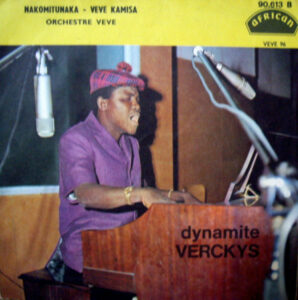 The most famous song of the recently deceased on October 13, 2022, Georges Kiamuangana Mateta, better known as Verckys, is “Nakomitunaka”, released by him in 1972. Nakomitunaka means “I wonder”…”. This song caused quite a stir in Africa at the time. After President Mobutu’s proclamation of “Authenticity”, in 1971, changing the name of the country of Congo to Zaire, banning European first names and European dress with suit and tie, obliging everyone to wear African clothes and to adopt a first name in Lingala, there is resistance from the Catholic Church. In response to this, Verckys composes “Nakomitunaka”. The Vatican then goes so
The most famous song of the recently deceased on October 13, 2022, Georges Kiamuangana Mateta, better known as Verckys, is “Nakomitunaka”, released by him in 1972. Nakomitunaka means “I wonder”…”. This song caused quite a stir in Africa at the time. After President Mobutu’s proclamation of “Authenticity”, in 1971, changing the name of the country of Congo to Zaire, banning European first names and European dress with suit and tie, obliging everyone to wear African clothes and to adopt a first name in Lingala, there is resistance from the Catholic Church. In response to this, Verckys composes “Nakomitunaka”. The Vatican then goes so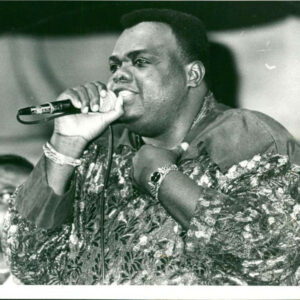 far as to ban this song and excommunicate anyone who sings it, resulting in African Catholics starting their own churches. Under the playlist you will find a translation of the lyrics of this song in Dutch, and with the help of the following link Nakomitunaka – La chanson qui a fait trembler le VATICAN you will find some background information and also the lyrics in French.
far as to ban this song and excommunicate anyone who sings it, resulting in African Catholics starting their own churches. Under the playlist you will find a translation of the lyrics of this song in Dutch, and with the help of the following link Nakomitunaka – La chanson qui a fait trembler le VATICAN you will find some background information and also the lyrics in French.
The singer in “Nakomitunaka” is Kabasele Yampanya, better known as Pépé Kallé. He was born on November 30, 1951 in Kinshasa. He begins his musical career in the orchestra l’African Jazz of Le Grand Kallé, whose real name is Joseph Athanase Tshamala Kabasele. In honor of him, his musical mentor, he takes the pseudonym Pépé Kallé. Later he sings with Orchester Bella Bella, the orchestra founded in 1970 by the brothers Maxim Soki Vangu and Emile Soki Dianzenza.
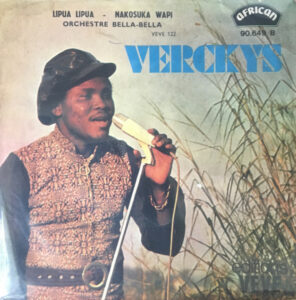 Verckys is not only a saxophonist and composer, but also a producer of a number of orchestras in Congo.
Verckys is not only a saxophonist and composer, but also a producer of a number of orchestras in Congo.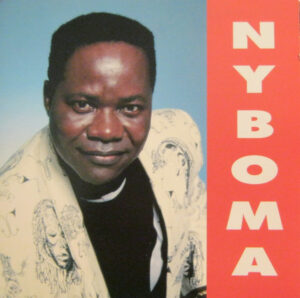 Orchester Bella Bella joins Verckys’ Vévé label until 1973. In 1972 Nyboma also starts singing Mwan’dido with Orchester Bella Bella. Nyboma was born in 1952 in Nioki, 200 km northeast of Kinshasa. A popular song by Nyboma with Orchester Bella Bella from that time is called Lipua Lipua. Nyboma and Pépé Kallé leave Orchester Bella Bella to form a new orchestra that they name after this song: Orchester Lipua Lipua. In April 1973, this orchestra releases a hit: “Kamalé”, which is considered the song of the year.
Orchester Bella Bella joins Verckys’ Vévé label until 1973. In 1972 Nyboma also starts singing Mwan’dido with Orchester Bella Bella. Nyboma was born in 1952 in Nioki, 200 km northeast of Kinshasa. A popular song by Nyboma with Orchester Bella Bella from that time is called Lipua Lipua. Nyboma and Pépé Kallé leave Orchester Bella Bella to form a new orchestra that they name after this song: Orchester Lipua Lipua. In April 1973, this orchestra releases a hit: “Kamalé”, which is considered the song of the year.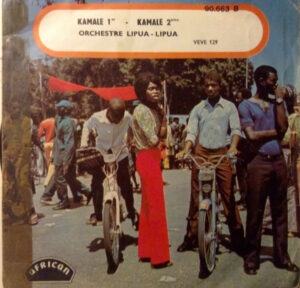 The title “Kamalé” comes from a friend of Nyboma’s trying to pronounce the French word “camarade”. In 1975 Nyboma and a few others left Lipua Lipua and founded the orchestra Kamalé. In the Mariama broadcast of December 2, 2022, Nybama could also be heard as a cantor at the “Animations politiques”. In the link Animation politique Zaïre, solo singing by Nyboma you can also see the then very young Nyboma singing.
The title “Kamalé” comes from a friend of Nyboma’s trying to pronounce the French word “camarade”. In 1975 Nyboma and a few others left Lipua Lipua and founded the orchestra Kamalé. In the Mariama broadcast of December 2, 2022, Nybama could also be heard as a cantor at the “Animations politiques”. In the link Animation politique Zaïre, solo singing by Nyboma you can also see the then very young Nyboma singing. 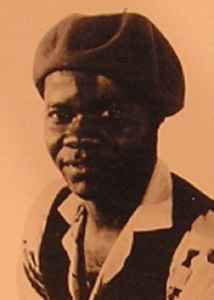 In 1972, Pépé Kallé, Dilu Dilumona and Papy Tex left Orchester Lipua Lipua to form their own band: Empire Bakuba, named after the traditional Kuba kingdom in Central Congo. Verckys is therefore the producer of all these orchestras. But he not only records the music of Empire Bakuba in his studios, in the song “Nazoki” he is also the singer.
In 1972, Pépé Kallé, Dilu Dilumona and Papy Tex left Orchester Lipua Lipua to form their own band: Empire Bakuba, named after the traditional Kuba kingdom in Central Congo. Verckys is therefore the producer of all these orchestras. But he not only records the music of Empire Bakuba in his studios, in the song “Nazoki” he is also the singer.
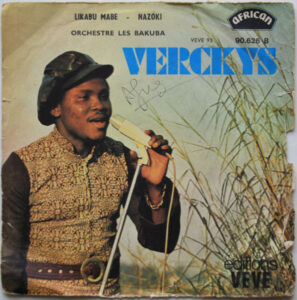 Pépé Kallé was a very tall, very stocky man. His height was 2.10 meters and he weighed 150 kilograms. In 1998 he dies of a heart attack.
Pépé Kallé was a very tall, very stocky man. His height was 2.10 meters and he weighed 150 kilograms. In 1998 he dies of a heart attack.
Verckys has also recorded music for the orchestras Les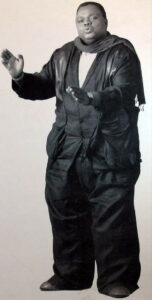 Grands Maquisards, Zaiko Langa Langa, Langa Langa Stars and Victoria Eleison in his Vévé recording studios.
Grands Maquisards, Zaiko Langa Langa, Langa Langa Stars and Victoria Eleison in his Vévé recording studios.
Les Grands Maquisards was founded in 1969 by Ntesa Daliènst and Dizzy Mandjeku, after Sam Mangwana dissolved his orchestra Festival des Maquisards.
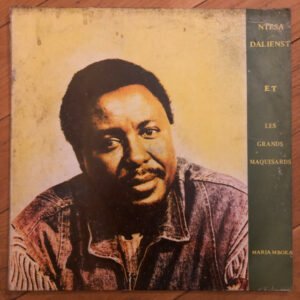 Zaiko Langa Langa has been around since 1969, and from a branch of this, Viva La Musica, a new branch was created in 1981, Langa Langa Stars.
Zaiko Langa Langa has been around since 1969, and from a branch of this, Viva La Musica, a new branch was created in 1981, Langa Langa Stars.
Victoria Eleison was founded in 1982 by Kester Emerite Emeneya (whose real name is Jean-Baptiste Emeneya Mubiala), when he left Viva La Musica after a split with Papa Wemba.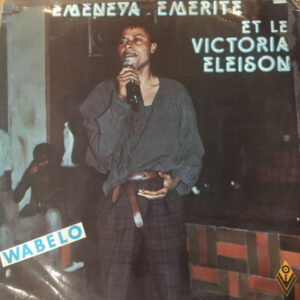
The meaning of some titles:
“Maria Mboka” = “The village of 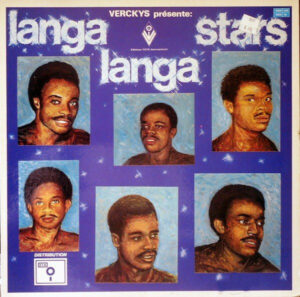 Mary”
Mary”
“Tokosenga Na Nzambe” = “We are going to ask God”
“Mbongwana” = “Change”
Some words are very common in Congolese songs, both in the titles and in the lyrics. For example, the word “BOLINGO” means “love” or “darling”. The word “MOTEMA” means “heart” and “MOTEMA NANGAYA” is “my heart”.
- Orchestre Kamalé: Ditu, author: Rickos Kinzunga, Single Editions Fuka-Fuka-1, 1975, African 90.861 B, 3’05
- Animation politiques Zaïre, Canta Nyboma, YouTube, 1’30
- Orchestre Lipua Lipua: Kamalé, author: Nyboma Danos, Single Kamalé, 1973, African 90.663 B, 5’30
- Orchestre Bella Bella: Lipua Lipua, author: Mulembu Tshibau, Editions Vévé VV.122, 4’50
- Verckys & Orchestre Vévé: Nakomitunaka, author: Single Série Vévé 96, 1972, African 90.613 B, 6’24
- Orchestre Les Bakuba: Nazoki, author: Seskain Molenga, Single Série Vévé 95, 1972, African 90.626 B, 4’50
- Orchestre Empire Des Bakuba: Massamba, author: Dilu Dilumona, Single Série Vévé 116, 1972, African 90.635 B, 4’52
- Ntesa Daliènst & Les Grands Maquisards: Maria Mboka, author: Ntesa Daliènst, Single Série Vévé 51, 1971, African 90.503 B, 5’50
- Ntesa Daliènst & Les Grands Maquisards: Tokosenga Na Nzambe, author: Ntesa Daliènst, Single Série Vévé 53, < 1971, African 90.496 B, 7’08
- Emeneya Emerite & Le Victoria Eleison: Wabelo, author: Fatema Lolae, LP Wabelo, 1986, Editions Vévé International EVVI 56, 4’30
- Langa Langa Stars: Mbongwana, author: Espérant Kisangani Ndjeinga-Ka, LP Verckys présente Langa Langa Stars, 1983, Editions Vévé International REM 340, 10’15
Text from Nakomitunaka:
I ask myself
My God, I ask myself
The black skin, where does that come from?
Our ancestor, who was he?
Jesus the son of God was a white
Adam and Eve were whites
All the saints were whites
Why, oh my God
In God’s books we see
All the angels: their images are white
All the saints: their images are white
But the devil: his image is black
This injustice, where does it come from, oh mother
Black skin, where does it come from
The Uncles (“les oncles”, the colonials) prevent us from understanding
Images of our ancestors, they don’t allow it
The fetishes of our ancestors, they don’t accept them
But in the church as we can see
Let’s pray with the rosary in hand
We pray to the images that the church is full of
But these images are all whites
My God why?
The prophets of the whites, we accept them
But those of the blacks, they do not accept
My God why did you make us this way?
Africa has opened its eyes
Africa, we won’t go back, oh mother
Produced by:






